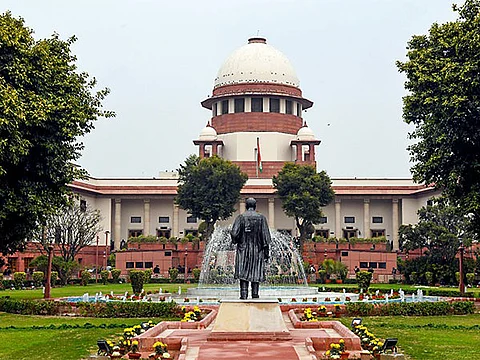

The Supreme Court recently directed the immediate release of a 24-year-old law student from Madhya Pradesh who had been under preventive detention for nearly a year under the National Security Act, 1980 (NSA), after noting that the Preventive detention of the appellant, was "wholly untenable".
The top court ordered that the petitioner (Appellant) Annu alias Aniket, be released forthwith from Central Jail, Bhopal, if he was not required in any other criminal case.
A two-judge vacation bench of the top court, led by Justice Ujjal Bhuyan and Justice Vinod Chandran observed that the grounds mentioned in the order, which include disruption of law and order did not satisfy the requirements of Section 3(2) of the Act.
"We are of the view that the reasons for which he has been taken into preventive detention does not satisfy the requirement of Sub Section(2) of Section 3 of the National Security Act, 1980. Preventive detention of the appellant, therefore, becomes wholly untenable", the top court observed.
Section 3(2) empowers the central and state governments to order preventive detention of a person acting in any way that threatens the security of the State, disturbs public order, or affects the supply of essential goods and services to the community.
The petitioner, had been booked following an altercation on June 14, 2024, at a university campus in Betul, allegedly after he clashed with a professor.Following this, an FIR was filed for attempt to murder and other offences against Annu, forcing him to surrender on June 16 and was placed in judicial custody.
While in jail, the NSA detention order was issued against him, on the ground of maintaining peace and law and order. This order was later confirmed and extended every three months.
After hearing Annu's appeal, the court said, "At the most, these are all issues of law and order. 'Public order' is something bigger".
The court noted that the petitioner was taken into preventive detention by an order dated July 11, 2024, issued by the District Magistrate of Betul, Madhya Pradesh. The detention order had been extended four times, with the last extension valid till July 12, 2025.
The state of Madhya Pradesh in its counter affidavit cited nine criminal antecedents, including the present case, to justify the detention under Section 3(2) of the NSA.
During the hearing, the appellant's (Annu's) counsel submitted that out of eight earlier cases, the petitioner had been acquitted in five, was fined in one case after conviction, and was on bail in the remaining two.
The affidavit also showed that in the present case, bail had been granted on January 28, 2025.
The Madhya Pradesh High Court had earlier dismissed the habeas corpus petition filed by the petitioner's father, observing that the petitioner had a long history of criminal cases and was a habitual offender whose presence posed a threat to public peace.
The high court cited the preventive nature of NSA detention and upheld the subjective satisfaction of the District Magistrate as sufficient. The HC noted that the petitioner had faced serious charges under Sections 307, 354, 452, and 353 of the Indian Penal Code (IPC) and that preventive detention was both a retributive and utilitarian measure in such cases.
It also held that procedural requirements under Sections 3(5), 8, and 10 of the NSA had been complied with.
After hearing the appeal of Annu, the Supreme Court disagreed and ordered his releas
